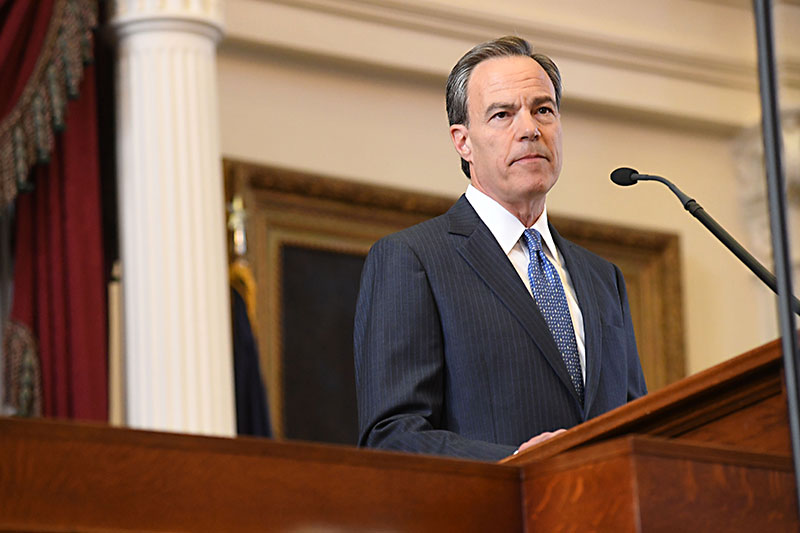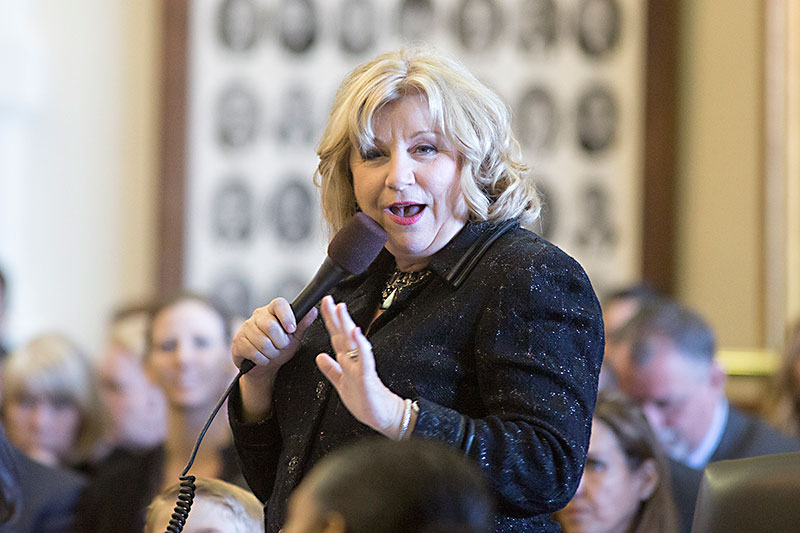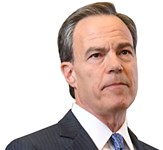Lege Lines – The Texas Legislature: Not Enron
Passing a state budget when one side’s “cooking the books”
By Richard Whittaker, Fri., March 31, 2017
It takes a lot to annoy Joe Straus.
If the Republican Texas House Speaker from San Antonio can be summed up in one word, it's measured. He's less of an ideologue than a discerning barometer of his chamber – a politician who once all-out ignored calls from members of his own party for a Christian speaker, knowing that Straus is Jewish. So when Straus accuses the Texas Senate of "cooking the books," it's another sign of his ongoing and increasingly explicit exasperation with the upper chamber's continued shenanigans. In this case, it's the financial double-dipping the Senate thinks can balance the budget.
Flash back to 2015 for a second, when Texas voters overwhelmingly backed Proposition 7 – a complicated measure whereby if state sales tax revenue broke $28 billion, the next $2.5 billion would go into the State Highway Fund. What the Senate proposes today is holding that payment from the last month of fiscal year 2019, and into the first month of FY 2020. On paper, that means the $2.5 billion intended for roads for FY 2019 is now unencumbered, leaving the Senate free to spend it.
If such a complicated piece of double-entry bookkeeping doesn't make sense, that's because it shouldn't, and Straus has not refrained from saying so. "This is the Texas Legislature," he told reporters last week through gritted teeth, just as the Senate Finance Committee approved the trick. "We are not Enron, and I am not interested in cooking the books just to avoid a vote on the Rainy Day Fund."
The Rainy Day Fund is the popular name for the state's Economic Stabilization Fund (or ESF), a pool of money designed to smooth out the state budget in years when revenues are down a bit. (Like, for example, this year.) In recent years the Senate has proven near-pathologically determined never to use the fund for its defined task.
The only constitutionally mandated task that the Texas Legislature must achieve in any given regular session is to pass a budget. That's a tough challenge this biennium; Comptroller Glenn Hegar has given lawmakers only $104.9 billion in his revenue estimate with which to build a budget. That's a 2.6% cut in revenue from the current biennium. Both chambers have already conceded that's not enough. Both are scrabbling to find some extra cash to cover the bills.
On March 28, the notoriously parsimonious Senate passed Senate Bill 1, its budget proposal that includes $106.3 billion in spending for the next two years – insufficient to cover even inflation and population growth since the passage of the 2016-17 budget. Moreover, that's just the discretionary spending: add in all spending from all revenue sources, most of it preallocated to programs, and the total bill comes to roughly $218 billion. However, as legislative think tank the Center for Public Policy Priorities noted, state agency heads have calculated that they need $232 billion just to keep services at their current level. That gap, CPPP Invest in Texas Program Director Eva DeLuna Castro said, "shows how severely the Senate budget would underfund education, health care, public safety, and other services."
Worst of all, the Senate's austerity spending proposal, which passed the full chamber on March 28, requires that $2.5 billion sales tax shuffle to even feign balance.
The House continues working on its own proposal, but its latest draft comes closer to $109 billion – still no great shakes, but those additional few billion could end up going a long way. Their plan eschews the Senate transportation shuffle (which many lawmakers worry may not be constitutional), and relies on a different bag of tricks, including a deferred payment to the Permanent School Fund (another accounting headscratcher that leaves the state on the hook for 25 months' spending next biennium) and up to $3 billion in Rainy Day spending. House Appropriations Committee Member Donna Howard, D-Austin, told the Chronicle: "We're piecemealing all kinds of things together, simply because we don't have the revenue."
Not that the Senate has locked the door on the Rainy Day Fund. While Lt. Gov. Dan Patrick and his supporters have drawn an inexplicable line in the sand, even Senate Finance Committee Chair Jane Nelson, R-Flower Mound, has suggested she'd be amenable to tapping the fund to cover some of the state's deferred maintenance issues. If that happens, the ESF spending could free up some general revenue dollars for other essential programs. Moreover, when Howard sat on the interim Joint Select Committee to Determine a Sufficient Balance of the Economic Stabilization Fund, she saw that Senate Republicans were not hellbent on demanding a massive unspent balance, and were open to uses beyond the transportation mandate. She said, "There's some recognition of doing things a little differently, but at the same time, it's what you are able to spend it on that is the crux of the problem."
The prevailing philosophy in the Senate seems to be that spending down the ESF is OK as long as it's not used for recurring expenses. There's a bloc in the House that sees things similarly, so House Appropriations is pumping money between pots to win them over. The greatest book-balancing trick every session is the supplemental appropriations bill (this year filed as House Bill 2). In recent years, whenever the Lege slaps itself on the back for passing a nominally balanced budget, it does so knowing that there are unavoidable bills – usually Medicare and public education – being very quietly left on the table with plans to pick them up again in two years' time. This year, the House was initially planning to use the ESF to finance HB 2. As of the beginning of this week, HB 2 will be paid for out of the surplus from the current biennium, covering around $1.3 billion in essential expenditures such as the Medicaid shortfall, prison managed care, and Child Protective Services. That'll free up money from the ESF to go into HB 1, the main budget.
That may sound like just shuffling checks, but it could provide essential political cover for dogmatic fiscal conservatives. Howard said, "My feeling in the House is that those that have been loath to use the ESF in the supplemental are comfortable with the idea of voting for it in HB 1." However, she warned, "It still remains to be seen if they're comfortable voting for it at all."
Got something to say on the subject? Send a letter to the editor.












